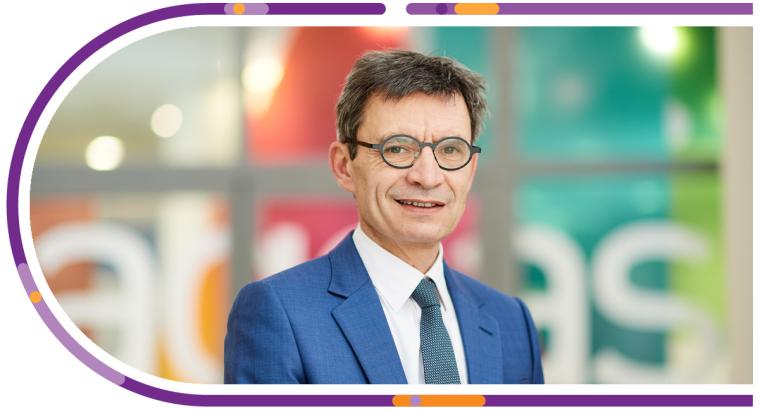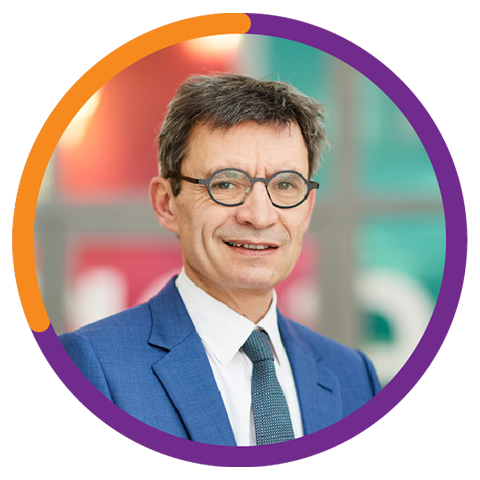A closer look at risk management
A talk with Chief Risk Officer Emmanuel Van Grimbergen about the challenges in the world of risk modelling anno 2021.

Let’s go back to basics. What is risk modelling and why is it so important?
Emmanuel: Put simply, it is about putting a number on an uncertain outcome. And as an insurer that’s the bread and butter of our business. By collecting the individual risks of policyholders, and combining them together, we are equipped to price risk in a way that is fair and beneficial to everyone. The better the risk is priced, the stronger the balance sheet will be, ensuring we can continue to serve our stakeholders and fulfil our promises to our shareholders.
Is our Group’s choice to promote local autonomy an advantage in risk modelling?
Emmanuel: Being local is a critical component in the way we work. Ultimately insurance is a local business and as such the insights we gain from being close to the customer and close to the market is a real advantage. A good example are wildfires. Wildfires occur more often in Portugal compared to the other European countries in which we are active. Combined with the global view of risks at the level of the Group, this helps strengthen our understanding of risk and feed our risk models.
How does the Group’s horizon scanning exercise benefit risk modelling?
Emmanuel: The risk management process has its own natural rhythm of data collection and analysis often reflecting our regulatory requirements and business priorities. Our internal Horizon Scan uses a combination of human and artificial intelligence to detect significant trends we need to consider and prepare for. It is a valuable tool when looking at new emerging risks. Not surprisingly this year climate change was escalated further in our thinking and actions.
What actions are being taken in the context of climate change and risk modelling?
Emmanuel: It is important to look at what we are already doing. As an example, let’s take the devastating floods in the summer of 2021 particularly in Belgium. We already include flooding in our risk model assessment in a very detailed way, as we have a lot of data and experience in this area. We try to predict the impact of a lot of different flood events. And this is now being put into the wider context of climate change, challenging some of our assumptions. Here again the strength of being local is critical. The initial analysis is done locally as ultimately, they experience at first hand the scenario and they are closest to the customer. Alongside this of course is the Group level risk modelling process which takes a view of the whole. This same approach would equally be applied to other events like the wildfires in Portugal.

Importantly we have included for the first time a climate change scenario in our ORSA report. This type of scenario will in time become a requirement of the regulators at both local and European level. ORSA stands for Own Risk and Solvency Assessment. It is in effect an internal assessment on the resistance of our capital as a Group and through this scenario planning exercise we are not just looking at the short-term impact of climate change. We take a 10+ year view on how we will react to different types of climate scenarios.
It is a learning process helping us to better anticipate, assess and manage risk: prevention instead of cure!

Understanding risk is one thing… but what really matters is drawing the right conclusions and applying what we know, to what we do.
Emmanuel Van Grimbergen, Chief Risk Officer Ageas
From a risk perspective, which achievements deserve a special mention in this final year of Connect21?
Emmanuel: Firstly, we are particularly proud of the extraordinary work done locally and at Group level to prepare our systems and process for IFRS17, the new accounting standards for insurers kicking in in 2023. Adapting our systems and models has been a monumental effort by so many people.
Secondly, we have also put a lot of effort into integrating Reinsurance into the overall risk modelling process. As Reinsurance is a future growth market for us within Impact24 this will become even more important. Whenever relevant, we are applying what we already do in risk modelling to the reinsurance market. Reinsurance contracts are naturally a lot more complex and less standardised requiring a more bespoke approach.
And finally, we have made strong headway in optimising our balance sheet as a Group, and this is a critical component in what we do within risk. Using Reinsurance, we have managed, in an efficient way, to make our capital more fungible and, as a consequence, we have been able to strengthen our balance sheet along the way.